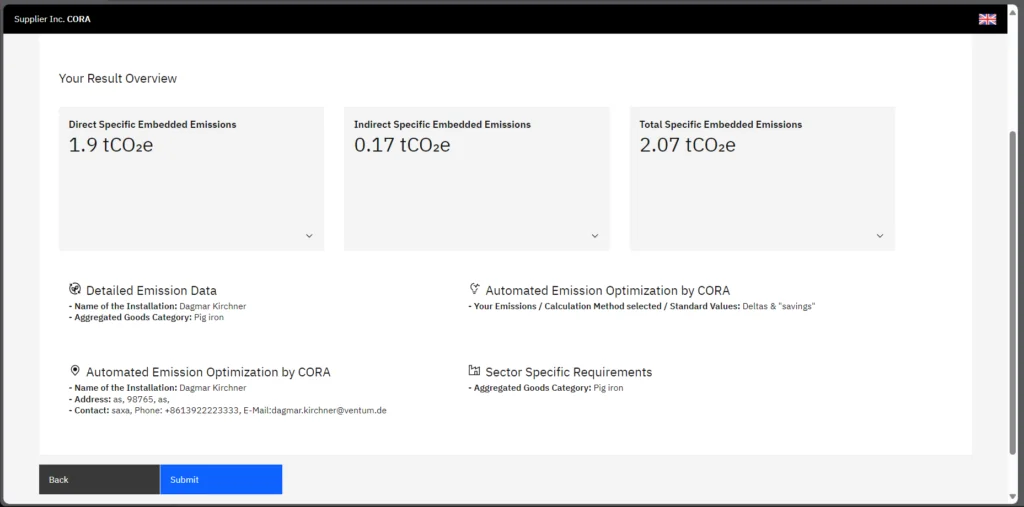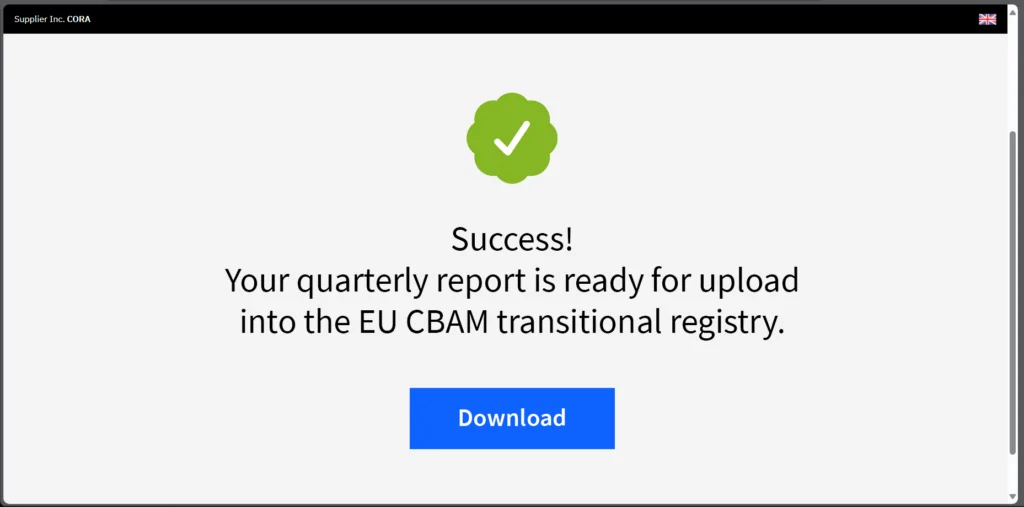CORA - Your integrated CBAM software
CORA - the efficient and compliant CBAM software
In a world where sustainability has become not just a choice but a necessity, companies face the challenging task of bringing their imports in line with the strict regulations of the European Union’s Carbon Border Adjustment Mechanism (CBAM). CBAM is the first regulation to require product and equipment-specific emissions data from your non-European partners. In such a complex landscape of regulations, the CBAM software CORA offers you the perfect platform to structure, automatically collect & validate the necessary data for your CBAM reporting.

Compliance with CBAM regulations will no longer be a headache with our CBAM software. Our tool is specifically designed to guide you and your suppliers systematically and step-by-step through the entire process of data collection, verification and reporting – efficiently, error-free and fully automated. Whether you’re dealing with the complexity of your global supply chain or navigating the latest regulatory updates, CORA gives you the clarity and support you need to not only be compliant, but to strategically optimize your carbon emissions.
The unbeatable advantages of our CBAM software:
Automated data capture: Say goodbye to manual processes and welcome a new era of efficiency. Your data is recorded directly via an input screen or a convenient Excel upload.
Precise emissions calculation: User-friendly, logically structured supplier survey and support for both default values and official calculation methods.
Intuitive reporting: Generate CBAM-compliant reports as XML or Excel with just a few clicks and always stay within the legal deadlines.
Strategic supplier management: Strengthen your supply chain through targeted data collection and analysis to help you make the best decisions.
Highest security and data protection standards: All your data is stored securely on servers in Germany to ensure compliance with the strictest data protection guidelines.
Discover how CORA makes reporting your CBAM data a breeze. Don’t hesitate to contact us directly for a demo or learn more below about how our solution can help your organization meet the challenges of today and tomorrow. A full list of features can be found here.
Maximum security for your data
When it comes to data security, CORA is setting new standards with the IBM Cloud Pak for Business Automation, which provides the technical basis. This platform not only offers powerful options for automating business processes, but also impresses with its comprehensive security and industry-specific expertise. IBM’s recent recognition as a “Leader” in the Forrester Wave™ Report Q4 2023 for Digital Process Automation Software as well as ISO/IEC 27001:2013 certification and GDPR compliance underpin its commitment to the highest security and data protection standards. For CORA users, this results in a reliable guarantee of the confidentiality and integrity of sensitive data and reports required for CBAM compliance.
CBAM reporting in 3 steps

User-friendly and complete data query
Your supplier enters all CBAM-relevant data, including emissions, production processes and CO2 prices already paid, directly into CORA via a multilingual input screen (including Chinese). The user is guided step by step and accompanied by explanations. The data is automatically checked for correctness and completeness in order to minimize the error rate.
Your contact for the CBAM software

– Johannes Keim, Ventum Consulting
Use the video tutorials in CORA
We have included clear video tutorials in CORA to make it easier for your suppliers to enter the data. These resources are specifically designed to simplify the CBAM reporting process and help your suppliers meet the requirements with ease.
They can access the videos directly in CORA and are guided step by step as they enter the data. Our tutorials offer clear instructions – for efficient and CBAM-compliant reporting.
Here you can see an example video in which we explain different reporting periods:

Strong partners for our CBAM software
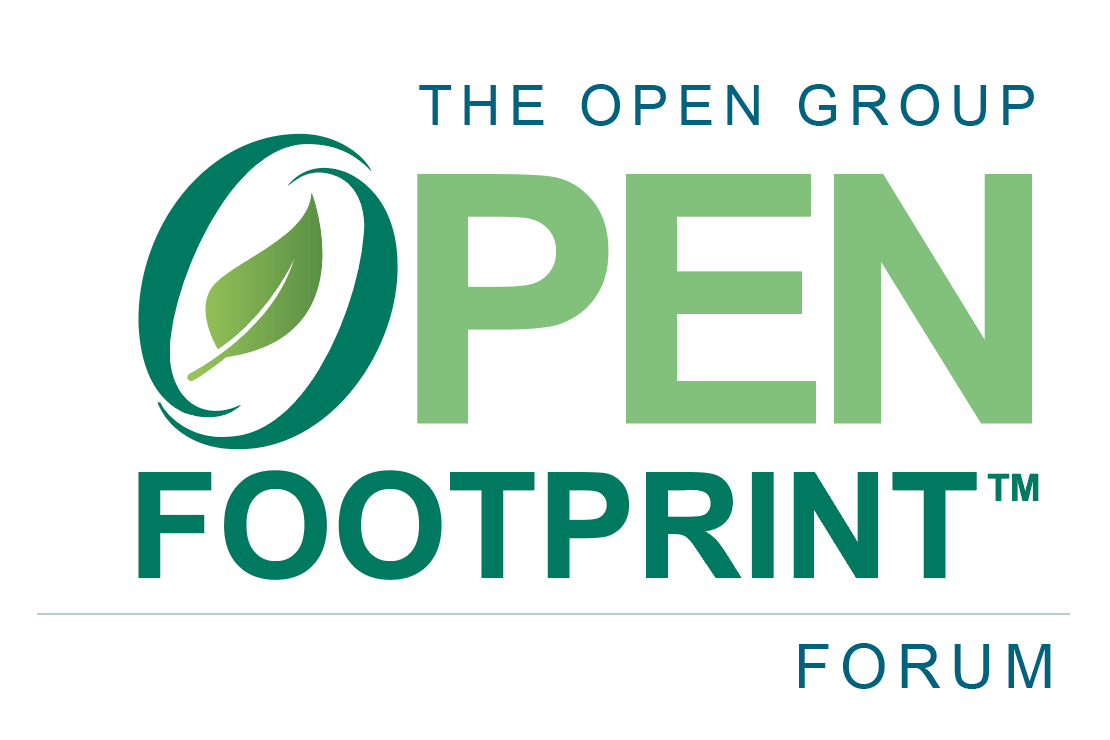
Use of the Open Footprint Datamodel (OFP)
For standardised calculation bases, comprehensible
emissions data and efficient data exchange

Use of the IBM Cloud Pak for Business Automation
For efficient, scalable and secure automation
thanks to advanced AI and analysis functions
The most important features of the CBAM software CORA
Holistic CBAM compliance solution
CORA is a Software-as-a-Service (SaaS) solution that holistically fulfills all CBAM requirements. From data collection to reporting, CORA supports you throughout the entire compliance process.
Optimized emissions calculation
CORA supports standard values as well as official calculation methods and can select the most favorable method for you. This allows you to create CBAM-compliant reports according to the latest guidelines.
Monitoring and optimization
CORA offers continuous monitoring of procurement data and identifies opportunities for CO2 reduction. This supports strategic decisions in relation to supplier selection and product development.
Integration and data transparency
CORA promotes integration into existing procurement and ESG systems to ensure full price and CO2 transparency. This makes it easier to adapt to CBAM requirements.
Multilingual support
The availability in multiple languages, including English and Chinese, makes CORA particularly suitable for global flows of goods and facilitates international data capture.
Flexible deployment options
CORA offers the flexibility to be implemented either as a cloud-based SaaS solution or on-premises, supporting different requirements in terms of security and IT infrastructure.
Process-oriented supplier survey
CORA's process-oriented approach guides suppliers through the compliance process with clear instructions and predefined calculation methods. You can monitor progress in real time via a dashboard.
Automated data acquisition
CORA simplifies data entry through direct input masks or Excel uploads. This function increases both efficiency and accuracy so that you can concentrate on the strategic use of producer data.
Highest safety standards
With data storage on German servers, CBAM's CORA software guarantees maximum security and data protection for your sensitive information and thus enables risk-free compliance.
Contact us now and request a demo
- In-depth understanding of CBAM regulations
- Tailor-made advice for your needs
- Highest security standards for your data
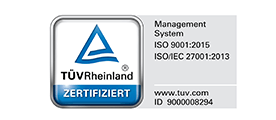
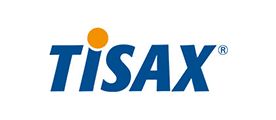
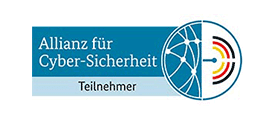
TISAX and ISO certification for the Munich office only
FAQs on the topic of CBAM software
CBAM is an EU initiative that was introduced as part of the European Green Deal. The aim is to create equality between EU-based companies and their international competitors by avoiding carbon leakage. This is achieved by reducing emissions from the production of imported goods and protecting European companies that invest in clean technologies.
CBAM concerns emission-intensive goods such as cement, electricity, fertilizers, iron & steel (including pipes and structural components), and aluminium imported from outside the EU. These goods were selected due to their high carbon footprint and their importance to the EU economy.
Almost the entire manufacturing and processing industry in the EU is affected. This affects companies that import CBAM-relevant goods, regardless of their size or the scope of their business activities. Particular attention is being paid to importers of fertilizers and electricity.
The reporting obligation has been in force since October 1, 2023. Companies that import CBAM goods must prepare detailed reports on the direct and indirect emissions of these goods. The first report for the 4th quarter of 2023 must be submitted by January 31, 2024. The reports must contain comprehensive data, including emissions from upstream products and the energy used.
Yes, you can use the CBAM default values, especially during the transition phase, to simplify the emission calculations for your imported goods. If you use a tool like CORA, it will automatically select the most favorable calculation method for you, so you don’t even have to think about whether you should use default values. You can find out more about CBAM default values in our blog article.
Complying with CBAM regulations can be a challenge due to their complexity and the associated administrative burden. A specialized tool such as CORA can greatly simplify this process by enabling automated data collection, accurate emissions calculations and the generation of compliant reports. By using such a tool, companies can save time, avoid errors and ensure that they effectively comply with regulatory requirements.
CORA automates and simplifies the process of data collection, emissions calculation and reporting. It provides an integrated platform that facilitates compliance with CBAM by reducing the administrative burden and ensuring data accuracy.
Yes, CORA is designed to be flexible to meet the needs of companies of all sizes. It offers scalable solutions that can be adapted to the specific requirements and size of a company’s import operations.
CORA is designed to integrate seamlessly with existing IT infrastructures, such as ERP systems and procurement platforms. This enables efficient data transfer and processing to support CBAM compliance.
CORA uses advanced security protocols and data protection measures to ensure the integrity and confidentiality of company and supplier data. All data is stored securely on servers in Germany to guarantee compliance with the strictest data protection standards.
Yes, CORA facilitates communication and coordination with suppliers through automated requests and data collection tools. This helps companies to obtain the necessary information from their suppliers efficiently and in good time.
CORA ensures that its data and integrated regulations are up to date through regular updates, which ensure that all information complies with the latest CBAM requirements and emission factors. The system is designed to automatically integrate the latest regulatory changes and adjustments as soon as they are published by the EU authorities. Users of CORA thus benefit from a platform that always reflects the current status of legislation and factors relevant to emissions calculations, enabling accurate and compliant reporting.
Yes, CORA offers functions for analyzing the supply chain in order to identify optimization potential with regard to CO2 emissions. By analyzing emissions data, the tool enables companies to identify areas with high emissions and make strategic decisions to improve CO2 efficiency. This can include finding alternative suppliers with lower emissions or making changes to the production process to reduce the overall emissions of imported goods.


